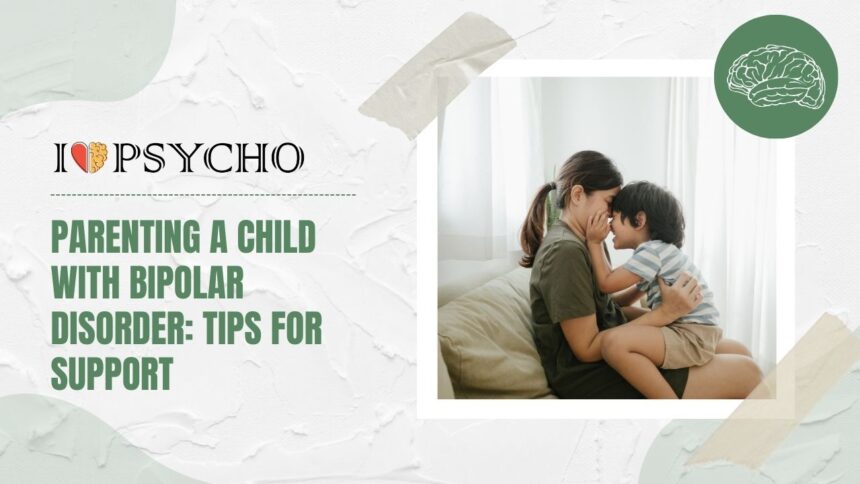Parenting is a journey filled with unexpected twists and turns, but when your child is diagnosed with bipolar disorder, the road can feel even more challenging. As a parent, you want nothing more than to support and nurture your child through every obstacle they face. In this blog post, we will explore valuable tips and insights to help you navigate the complexities of parenting a child with bipolar disorder. Let’s embark on this journey together and discover how you can provide the best possible support for your little one.
Understanding Bipolar Disorder in Children
Bipolar disorder in children is a mental health condition characterized by extreme mood swings. These fluctuations can range from manic episodes of heightened energy and euphoria to depressive periods of sadness and low energy levels. Unlike typical mood swings, bipolar disorder symptoms are more severe and can interfere with daily life. It’s important to recognize that children with bipolar disorder may experience intense emotions that are beyond their control.
The exact cause of bipolar disorder in children is not fully understood, but genetics, brain structure, and chemical imbalances play a role in its development. Early identification and intervention are crucial for managing the symptoms effectively. Children with bipolar disorder may also exhibit impulsivity, irritability, difficulty concentrating, and risky behavior during manic episodes.
Understanding the unique challenges of bipolar disorder in children can help parents provide the necessary support and resources to help their child thrive despite the condition’s complexities.
The Importance of Support for Parents and Children
Navigating the challenges of parenting a child with bipolar disorder can be overwhelming. It’s crucial for both parents and children to have a strong support system in place.
Support can come from various sources, such as family members, friends, therapists, or support groups. These individuals can provide understanding, empathy, and practical guidance on how to manage the complexities of bipolar disorder.
For parents, having a supportive network can help alleviate feelings of isolation and stress that often accompany caring for a child with mental health challenges. It’s essential to lean on others for emotional support when needed.
Children also benefit greatly from knowing they have a team of people rooting for them and helping them navigate their emotions. Feeling supported can boost their self-esteem and resilience in facing the ups and downs that come with bipolar disorder.
Remember, seeking support is not a sign of weakness but rather a courageous step towards ensuring the well-being of both you and your child.
Tips for Supporting a Child with Bipolar Disorder
Parenting a child with bipolar disorder can present unique challenges, but with the right strategies and support, it is possible to navigate this journey successfully. One key tip for supporting your child is to establish consistent routines and clear boundaries. Children with bipolar disorder often thrive in structured environments that provide predictability and stability.
Another important tip is to educate yourself about the condition. Understanding the symptoms and triggers of bipolar disorder can help you anticipate and manage potential mood swings effectively. Additionally, communication is crucial when supporting a child with bipolar disorder. Encourage open dialogue where your child feels heard and supported without judgment.
It’s also essential to work closely with your child’s healthcare providers to develop a comprehensive treatment plan tailored to their individual needs. This may include therapy, medication, or other interventions aimed at managing symptoms and promoting overall well-being. Remember, you are not alone in this journey – seeking support from mental health professionals, support groups, or other parents facing similar challenges can make a significant difference in both you and your child’s well-being.
Seeking Professional Help and Creating a Treatment Plan
Seeking professional help is crucial when supporting a child with bipolar disorder. A mental health professional, such as a psychiatrist or psychologist, can provide an accurate diagnosis and tailor a treatment plan to meet your child’s specific needs. They will assess symptoms, behaviors, and overall well-being to determine the best course of action.
Creating a treatment plan involves various components, including therapy, medication management, and lifestyle adjustments. Therapy can help children learn coping skills, manage emotions effectively, and improve communication. Medication prescribed by a healthcare provider may also be necessary to stabilize mood swings and reduce symptoms.
It’s essential to collaborate closely with the professionals involved in your child’s care to monitor progress and make any necessary adjustments to the treatment plan. Open communication between caregivers and healthcare providers is key in ensuring the best outcomes for your child.
Taking Care of Yourself as a Parent
Parenting a child with bipolar disorder can be incredibly challenging, both emotionally and physically. It’s essential to remember that taking care of yourself is not selfish but necessary for the well-being of your child.
Find moments in your day to practice self-care, whether it’s going for a walk, reading a book, or simply taking deep breaths to center yourself. Lean on your support system – friends, family, or a therapist – who can provide understanding and guidance during tough times.
Set boundaries with others and learn to say no when you need time for yourself. Remember that you’re doing the best you can and that it’s okay to ask for help when needed.
Prioritize sleep, nutrition, and exercise as these basic needs are often overlooked in times of stress. Practice mindfulness techniques or engage in activities that bring you joy and relaxation.
Taking care of yourself isn’t just important; it’s crucial for maintaining the strength and resilience needed to support your child effectively.
Signs and Symptoms to Look Out For
As a parent, it’s crucial to be aware of the signs and symptoms that may indicate bipolar disorder in your child. One common indicator is extreme mood swings – from high energy and euphoria to deep sadness or irritability. Keep an eye out for changes in sleep patterns; insomnia or oversleeping could be red flags.
Another symptom to watch for is impulsivity or risky behavior that seems out of character for your child. Pay attention if they have difficulty concentrating or completing tasks, as this could also point towards bipolar disorder.
Physical symptoms like headaches or stomachaches without any underlying medical cause can sometimes accompany the emotional shifts in children with bipolar disorder. Additionally, sudden weight loss or gain might be linked to changes in their mood stability.
If you notice these signs persisting over time and impacting your child’s daily life, it might be worth seeking professional guidance for further evaluation and support. Remember, early detection and intervention can make a significant difference in managing bipolar disorder effectively.
Navigating School and Social Situations
Navigating school and social situations can pose unique challenges for children with bipolar disorder. It’s important to communicate openly with your child’s teachers and school counselors about their condition. By providing them with insight into your child’s needs, you can work together to create a supportive environment.
Encourage your child to join activities or clubs where they feel comfortable and accepted. Building positive relationships with peers can boost their self-esteem and sense of belonging. Teach them coping strategies to manage stress or anxiety in social settings.
Help your child understand the importance of self-care during busy school days. Encourage breaks when needed and ensure they have a quiet space to recharge if feeling overwhelmed. Consistency in routines at home and school can provide stability for your child.
Address any instances of bullying or misunderstanding promptly. Educate others about bipolar disorder if necessary, fostering empathy and reducing stigma surrounding mental health challenges in the school community.
Resources for Parents of Children with Bipolar Disorder
Navigating the challenges of parenting a child with bipolar disorder can be overwhelming. It is crucial for parents to access resources that provide support and guidance tailored to their specific needs. Fortunately, there are various organizations and online platforms dedicated to assisting parents in understanding and managing their child’s condition.
Support groups can be invaluable for connecting with other parents facing similar struggles. These groups offer a safe space to share experiences, seek advice, and find emotional support from those who truly understand what you’re going through. Online forums and social media communities also provide opportunities for networking and learning from others who have firsthand experience with bipolar disorder in children.
Educational resources such as books, articles, and webinars can help parents gain valuable insights into the nature of bipolar disorder and effective strategies for coping with its symptoms. Additionally, workshops and seminars conducted by mental health professionals can equip parents with practical tools to navigate the complexities of their child’s condition more effectively.
Furthermore, seeking guidance from reputable mental health organizations like the National Alliance on Mental Illness (NAMI) or Child Mind Institute can offer reliable information, advocacy resources, and access to expert advice. These organizations often host events, provide educational materials, and promote awareness about childhood bipolar disorder within the community.
In addition to these external resources, it’s essential for parents to prioritize self-care practices that nurture their own well-being amidst the demands of caring for a child with bipolar disorder. Remember that seeking help is not a sign of weakness but rather a proactive step towards ensuring both your child’s and your own mental wellness.
Conclusion
Parenting a child with bipolar disorder can be challenging, but with the right support and resources, it is possible to navigate this journey. Understanding the condition, seeking professional help, taking care of yourself as a parent, and being aware of signs and symptoms are crucial in providing effective support for your child. Remember that you are not alone in this journey – there are resources available to help you every step of the way. By staying informed, proactive, and compassionate, you can create a safe and nurturing environment for your child to thrive despite their challenges. Your dedication and love as a parent will make a significant difference in your child’s well-being and future success. Stay strong, stay informed, and remember to take care of yourself too throughout this process.









